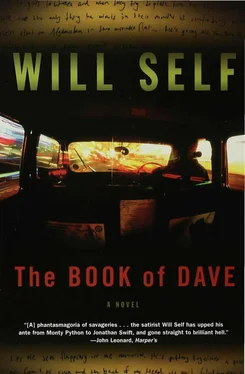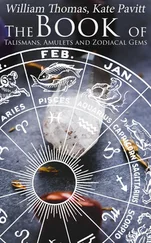Sadly, with each successive generation the giants grew smaller in stature, their arts declined, and their ambitions shrank. Where once they had been frantic rappers, spinning word pictures of great solidity and duration out of the island's mist, now all poetry deserted them. Where once they could lift huge rocks and uproot mighty trees, now they could barely summon the strength to cultivate their meagre fields. They became subjects of the island — rather than its lawds and luvvies. In time the Lawyer of Chil's Hack came among them, supplanting their native mushers and replacing them with the Drivers of the PCO, brought from London in the far north.
The mushers had been ordinary Hamsters — dads with kiddies of their own. The Drivers were queers — men who had no desire to father children. Such a strange inclination, which, if known at all on Ham, was suppressed, made these dävines still more alien and imposing to the simple peasants.
If little Sy was disposed to give any credence to his mother's tales, then it was only a semi-belief. For every fourth day Changeover would come, and he'd be sent across the stream with his cousins to stop at the daddies' gaffs. Here a rigid Dävinanity held sway: the runs and the points were ceaselessly called over whenever the dads were not at work or amusing themselves with the opares. For little Symun — as much as for the other kids, who were not so exposed to the ancient lore — their mummies' influence was eclipsed entirely. It was as if when they were with their daddies the kids were other people altogether, with different natures, different likes, different fares even. Yet none more so than Symun, because, while the other kids ran to their daddies at Changeover, he had no dad of his own. Peet Dévúsh had fallen from the Sentrul Stac to his death before his only son was born, so Symun was the lad of all the dads, making him still more of a daddies' boy when he was under their care and control.
Although the last Driver to be dropped off on Ham had been picked up five years before Symun was born, his influence remained strong among the dads. The most dävine among them would not talk or look at the womenfolk, and avowed that they did not even recognize the mummies of their own kids. Had these fanatics prevailed, they would have wrapped all the mummies up in their cloakyfings from top to toe. If the dads were to be believed — especially the two or three of them who could read — the Book was all the understanding any Hamster needed of anything. The Book stood outside of the seasons and of the years. What Dave had described he had also foretold, and what he had seen in his own era would come again — for it had never truly gone. Dave's New London was all around them, trapped in the zones and the reef, a hidden yet still tangible world. Just as the roots of the herb pilewort resembled piles and so were good for the treatment of this malady, so the Daveworks were tiny pictures and fragmented legends of a transcendent city of Dave — Dave the Dad and Carl the Lost Boy — that had been deposited there, by Dave, at the MadeinChina. The problem for the Hamsters was not to build a New London but only to prove themselves worthy of realizing it by their Knowledge.
In the time of the last Driver all Daveworks had been rejected as toyist, and the practice of garlanding the gaffs, wayside shrines, the island's pedalo — and indeed themselves — with the plastic amulets had been forbidden. The mummies — who were, of course, denied the rituals of the Shelter — continued to believe in the ancient lore. Their Knowledge was of the Mutha, not Chelle, and of the lost Ham, rather than the Lost Boy. Denied their kids for half of each blob, they cleaved to the motos, and they looked to the knee woman and her anointing for their absolution.
As the years passed the less dävine of the dads allowed their faith, once more, to become softened by their temperate and isolate home. Even the Guvnor, Dave Brudi, began to speculate on such things. In his own youth he had travelled to Chil, and he told Symun that the giants' ruins were greater in their density here on Ham than in any other part of Ing; and, try as he might, he could not help but give credence to the legend that this was because the Book had been found, as he put it, rì ear on Am.
Symun Dévúsh grew to dadhood. He was a charismatic young bloke, attractive to both sexes — taller than his peers, finer boned, more open of countenance. His fingers were quick and dextrous, his eyes blue and dancing. His light beard was golden and curly, while the Hamsters' barnets were mostly a lank, dun brown. If there had been any reflective surface on Ham besides still water and dull irony, Symun might have been vain; as it was, he was aware of his appeal to others, without knowing precisely what it consisted of. Although he was popular with his posse and a good holder of the Book, there could never be any question of Symun reaching the first cab of the Shelter. He was an orphan, his mummy the knee woman. This meant that, unlike his best mate, Fred Ridmun, he was destined to be always a waver-upper, never the fare.
The autumn he and Fred turned fourteen, the two lads changed over for the last time and took their permanent place in the dads' gaffs. Then a peculiar thing happened to Sy. While he was still growing up he had never thought to question any of the kids about what they felt at Changeover — mummytime was for mummies, daddy time for daddies. He knew that, like him, they left their mummyselves on the east bank of the stream and that even their most recent memories of cuddleup and snuggledown were as half-remembered dreams.
Yet, when he changed over for the last time Symun Deviish took his mummyself with him — not entire but enough of it for him to feel marked out from the other Hamstermen. Unlike Fred, Sy couldn't prevent himself from looking at the mummies and kids when he saw them together — he even had eyes for the old boilers. Fred noticed it and teased him, saying, If U wanna lookit byrds, vares plenny uv opares on vis syde uv ve streem. Although Sy became more circumspect, Effi noticed his gaze as well, and when she returned it, Sy saw in turn that she knew what had happened, she understood what she had done by seeding his fertile imagination with such potent lore. She smiled at him often and strangely. However, he couldn't detect much love in these smiles, only fear.

— Eyem gonna go onna bí! Symun called to the rest of the gang, C if vairs anyfing bettah ovah vair!
And Fred called back:
— Yeah, orlrì, but nó 2 fa.
— Eye ear yer, Symun called back, while to himself he said, Sillë gí.
He shouldered his mattock and pushed his way between two banks of pricklebush that scratched him through his shirt. It was an overcast day in SEP and a year since Symun's Changeover. Foggy rags snagged at the soaking foliage and the screenwasher was on. This was good weather for gathering building material, the soil loose and yielding. If they found a pile of brickwork, beat back the undergrowth, then wedged and wielded their mattocks efficiently, the morta would crumble away and the individual bricks tumble from the earth — Dave's bounty for the young dads of Ham.
At Council that first tariff the five young dads had asked if they could go to the edge of the Ferbiddun Zön and fetch some brick to repair the pedalo gaff. It took most of the rest of the tariff for consensus to emerge, for each of the nine older dads had a view, and they all had tremendous affection for the sound of their own voices. There were moto gibbets to be built, fowling equipment to be repaired, the pedalo needed caulking — however, eventually permission was given. It mattered that it was Fred Ridmun's idea. The whole community understood that despite Fred's youth he would be the new Guvnor once Dave Brudi was dead, and the way the old dad retched and hawked blood that couldn't be far off. It was an important liberty for the five to be alone together for a shift. In the next year duty would bear down still more heavily upon them. Caff Funch, old Benni's daughter, was already knocked up by Fred — more of them would become dads soon enough. Meanwhile the older generation was passing into the shadows. Ham, as was the way every thirty years or so, stood on the cusp.
Читать дальше













